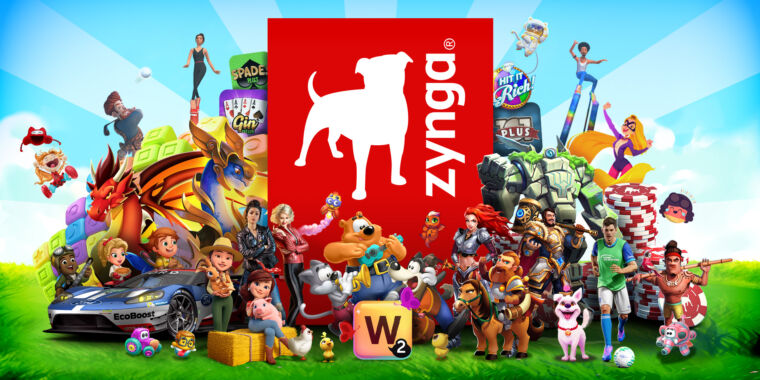Zynga must pay IBM nearly $45 million in damages after a jury ruled that popular games in its FarmVille series, as well as individual hits like Harry Potter: Puzzles and Spells, infringed on two early IBM patents.
In an SEC filing, Zynga reassured investors that “the patents at issue have expired and Zynga will not have to modify or stop operating any of the games at issue” as a result of the loss. But the substantial damages owed will likely have financial implications for Zynga parent company Take-Two Interactive Software, analysts said, unless Zynga is successful in its plans to overturn the verdict.
A Take-Two spokesperson told Ars: “We are disappointed in the verdict; however, believe we will prevail on appeal.”
For IBM, the win comes after a decade of failed attempts to stop what it claimed was Zynga’s willful infringement of its patents.
In court filings, IBM told the court that it first alerted Zynga to alleged infringement in 2014, detailing how its games leveraged patented technology from the 1980s that came about when IBM launched Prodigy.
But rather than negotiate with IBM, like tech giants Amazon, Apple, Google, and Facebook have, Zynga allegedly dodged accountability, delaying negotiations and making excuses to postpone meetings for years. In that time, IBM alleged that rather than end its infringement or license IBM’s technologies, Zynga “expanded its infringing activity” after “openly” admitting to IBM that “litigation would be the only remaining path” to end it.
This left IBM “no choice but to seek judicial assistance,” IBM told the court.
IBM argued that its patent, initially used to launch Prodigy, remains “fundamental to the efficient communication of Internet content.” Known as patent ‘849, that patent introduced “novel methods for presenting applications and advertisements in an interactive service that would take advantage of the computing power of each user’s personal computer (PC) and thereby reduce demand on host servers, such as those used by Prodigy,” which made it “more efficient than conventional systems.”
According to IBM’s complaint, “By harnessing the processing and storage capabilities of the user’s PC, applications could then be composed on the fly from objects stored locally on the PC, reducing reliance on Prodigy’s server and network resources.”
The jury found that Zynga infringed that patent, as well as a ‘719 patent designed to “improve the performance” of Internet apps by “reducing network communication delays.” That patent describes technology that improves an app’s performance by “reducing the number of required interactions between client and server,” IBM’s complaint said, and also makes it easier to develop and update apps.
The company told the court that licensing these early technologies helps sustain the company’s innovations today.
As of 2022, IBM confirmed that it has spent “billions of dollars on research and development” and that the company vigilantly protects those investments when it discovers newcomers like Zynga seemingly seeking to avoid those steep R&D costs by leveraging IBM innovations to fuel billions of dollars in revenue without paying IBM licensing fees.
“IBM’s technology is a key driver of Zynga’s success,” IBM argued back in 2022, and on Friday, the jury agreed.
“IBM is pleased with the jury verdict that recognizes Zynga’s infringement of IBM’s patents,” IBM’s spokesperson told Ars.
Cost of pre-Internet IBM licenses
In its defense, Zynga tried and failed to argue that the patents were invalid, including contesting the validity of the 1980s patent—which Zynga claimed never should have been issued, alleging it was due to “intent to deceive” the patent office by withholding information.
It’s currently unclear what licensing deal IBM offered to Zynga initially or how much Zynga could have paid to avoid damages awarded this week. IBM did not respond to Ars’ request to further detail terms of the failed deal.
But the 1980s patent in particular has been at the center of several lawsuits that IBM has raised to protect its early intellectual property from alleged exploitation by Internet companies. Back in 2006, when IBM sued Amazon, IBM executive John Kelly vowed to protect the company’s patents “through every means available.” IBM followed through on that promise throughout the 2010s, securing notable settlements from various companies, like Priceline and Twitter, where terms of the subsequent licensing deals were not disclosed.
However, IBM’s aggressive defense of its pre-Internet patents hasn’t dinged every Internet company. When Chewy pushed back on IBM’s patent infringement claims in 2021, the pet supplier managed to beat IBM’s claims by proving in 2022 that its platform was non-infringing, Reuters reported.
Through that lawsuit, the public got a rare look into how IBM values its patents, attempting to get Chewy to agree to pay $36 million to license its technologies before suing to demand at least $83 million in damages for alleged infringement. In the end, Chewy was right to refuse to license the tech just to avoid a court battle.
Now that some of IBM’s early patents have become invalid, IBM’s patent-licensing machine may start slowing down.
For Zynga, the cost of fighting IBM so far has not restricted access to its games or forced Zynga to redesign its platforms to be non-infringing, which were remedies sought in IBM’s initial prayer for relief in the lawsuit. But overturning the jury’s verdict to avoid paying millions in damages may be a harder hurdle to clear, as a jury has rejected what may be Zynga’s best defense, and the jury’s notes and unredacted verdict remain sealed.
According to Take-Two’s SEC filing, the jury got it wrong, and Take-Two plans to prove it: “Zynga believes this result is not supported by the facts and the law and intends to seek to overturn the verdict and reduce or eliminate the damages award through post-trial motions and appeal.”

